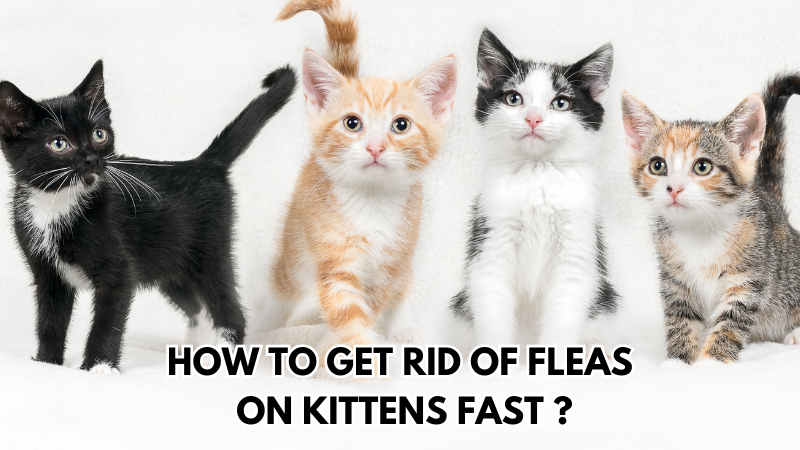If you’ve ever had a sick kitten on your hands, you know how heartbreaking it can be. One of the scariest moments is when they refuse to eat.
Food is vital for their recovery, but when your little furball turns away from the bowl, it can leave you feeling helpless. You might be wondering, “How do I get my kitten to eat?”
The good news is there are several strategies you can try to encourage your kitten to eat and get back on the road to health.
In this article, we’ll walk you through practical, easy-to-follow tips on how to get your sick kitten to eat. By the end, you’ll feel more confident about helping your kitten through this tough time.
Why Is My Sick Kitten Refusing to Eat?
First, let’s talk about why your kitten might not be eating. When a kitten is sick, it can lose its appetite for several reasons.
Common illnesses like respiratory infections can make it difficult for them to smell their food, which is a big turn-off for cats since they rely heavily on their sense of smell to decide if food is appetizing.
Pain or discomfort, whether from dental issues or an upset stomach, can also make eating unappealing.
Additionally, stress or anxiety, especially if the kitten is in a new environment or has recently undergone a change (like moving to a new home), can contribute to a loss of appetite.
How to Get a Sick Kitten to Eat ?
Knowing the root cause of your kitten’s refusal to eat can help you choose the right approach to get them interested in food again. Following are some ways to help your sick kitten to eat :
Warm Up Their Food
One of the simplest tricks to entice a sick kitten to eat is to warm up their food.
Cats have a strong sense of smell, and warming the food can make it smell more appealing. Think of it like warming up leftovers for yourself—it just tastes better when it’s warm.
To do this, place the wet food in the microwave for a few seconds until it’s slightly warmer than room temperature.
Be careful not to overheat it. You don’t want to burn your kitten’s mouth.
Stir the food well to make sure there are no hot spots before serving.
Offer Strong-Smelling Foods
Since smell is so important to cats, offering food that has a strong, enticing smell can sometimes do the trick.
Tuna, sardines, or specially formulated kitten foods with a strong aroma might get your kitten interested in eating. According to PetMD, smelly, high-protein options like these can stimulate a kitten’s appetite.
If you don’t usually feed your kitten tuna or other strong-smelling fish, now might be a good time to break that rule.
You can also try offering warmed chicken broth (without onions or garlic) to see if the smell and taste encourage your kitten to eat.

Hand-Feed Your Kitten
Sometimes, kittens need a little extra TLC when they’re not feeling well.
Try hand-feeding them small bites of food. This close interaction might encourage your kitten to eat, especially if they associate you with comfort and safety.
To hand-feed, place a small amount of wet food or a specially designed kitten formula on your finger and gently offer it to your kitten.
You might need to be patient and persistent, as they may only take small amounts at a time.
Try Different Foods and Textures
Kittens, like humans, have preferences when it comes to food textures.
If your kitten isn’t eating their usual food, try offering a variety of options.
Some kittens may prefer pate-style wet food, while others might like something with chunks or gravy. Experiment with different textures to see what your kitten responds to best.
You can also mix a little bit of their favorite treat or baby food (make sure it’s kitten-safe and doesn’t contain onions or garlic) with their regular food to make it more appealing.
Variety can sometimes be the key to getting them to take that first bite.
Use Feeding Syringes or Droppers
If your kitten is still refusing to eat on their own, you may need to take a more proactive approach.
Feeding syringes or droppers can help you ensure that your kitten gets some nutrition, even if they’re not eating voluntarily.
Mix a high-calorie kitten formula or watered-down wet food into a smooth consistency and carefully feed it to your kitten using the syringe or dropper.
Be gentle and take it slow, giving your kitten time to swallow and rest between small amounts. This method can be a lifesaver for kittens that are too weak or sick to eat on their own.
Important: Consult your vet before using this method, as they can guide you on how much and how often to feed your kitten this way.
Create a Calm Environment
A stressed kitten is less likely to eat. If your kitten has recently been through a stressful experience, such as a move or introduction to a new pet, try to create a calm and quiet environment for them to eat in.
Make sure they have a comfortable, safe space where they can eat undisturbed.
Sometimes, just reducing their stress levels can be enough to encourage them to start eating again.
When to Worry ?
If your kitten hasn’t eaten for more than 24 hours, it’s time to consult your vet.
Kittens have small reserves of energy and can quickly become weak if they don’t eat.
Your vet can help diagnose any underlying health issues and might provide appetite stimulants or other treatments to get your kitten back on track.
Veterinarians can also provide specialized advice based on your kitten’s specific situation, such as dietary recommendations or suggestions for supplements that can boost their nutrition intake while they’re recovering.

Bonus Tip: Keep an Eye on Hydration
While focusing on getting your kitten to eat, don’t forget about hydration.
Dehydration can quickly become a serious issue for sick kittens.
If your kitten isn’t drinking water, try offering them water mixed with a bit of tuna juice or low-sodium chicken broth to make it more enticing.
Another option is to use an oral syringe to gently give your kitten water or an electrolyte solution designed for cats.
Keeping your kitten hydrated is just as important as getting them to eat.
Read: What Should a Growing Kitten Eat in a Day ?
Getting a sick kitten to eat can be a challenging and stressful experience, but with patience and persistence, you can help your little one regain their appetite.
By trying different foods, warming up their meals, and providing a calm environment, you increase the chances of getting your kitten to eat and start feeling better.
Always keep a close eye on your kitten’s condition and don’t hesitate to reach out to your vet for advice.
Remember, every kitten is different, and what works for one may not work for another.
Trust your instincts and keep trying until you find what works best for your furry friend.***
Watch Videos about Cat & Kitten Care on Youtube @naowthecat